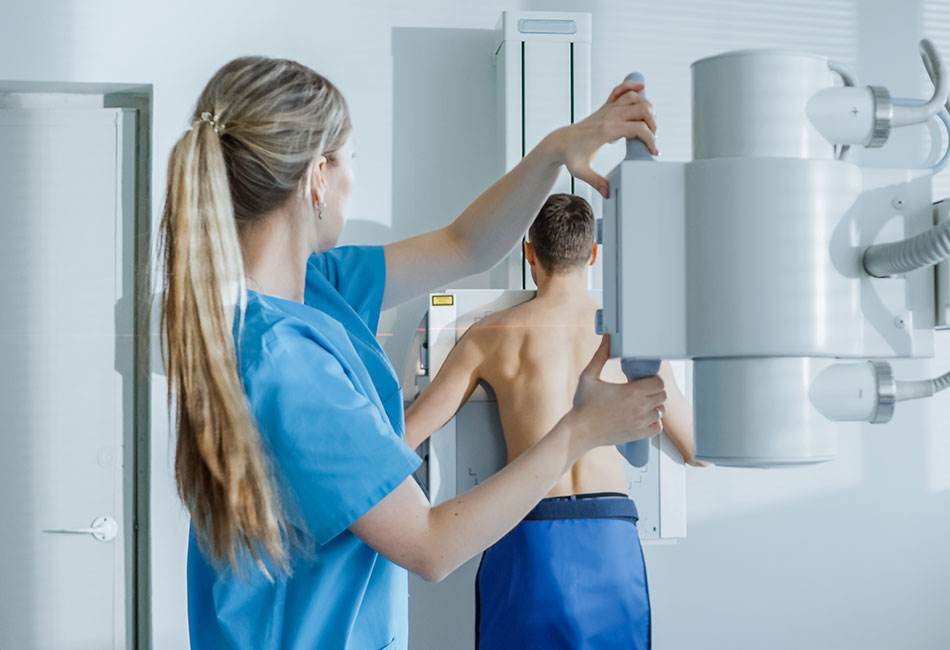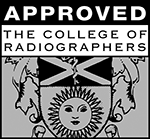
Higher/Degree Apprenticeship Diagnostic Radiographer
BSc(Hons) Diagnostic Radiography
About
Our Diagnostic Radiographer apprenticeship will give you the clinical skills to practice as a qualified diagnostic radiographer. The course is approved by the College of Radiographers (COR).
Why study for a Diagnostic Radiographer apprenticeship?
When a patient is first admitted to hospital, they'll undergo diagnostic assessment to ensure they receive the treatment they need. At this stage, a Diagnostic Radiographer will play a critical role in obtaining and examining images of the patient's body to start the diagnosis process.
To produce and interpret diagnostic images, radiographers are equipped with broad knowledge and skills, including patient care and management, anatomy, physiology, professional practice and digital technology. Due to the specialist expertise needed and pressures on healthcare services, Diagnostic Radiographers are in high demand, providing vital practice care and supporting the patient through their diagnostic pathway.
Our Diagnostic Radiography Degree Apprenticeship (Level 6) enables practitioners working in the NHS and private healthcare sector to train as qualified Diagnostic Radiographers, over a three-year period. You'll study the science that underpins effective diagnosis, using specialist imaging equipment to help diagnose surgical, medical or vascular conditions, cancer and complex injuries.
Throughout the course, you'll develop your skills and knowledge in Magnetic Resonance Imaging (MRI), Ultrasound, Computed Tomography (CT) and Nuclear Medicine, plus interventional studies and image reporting. By the end of the course, you'll become a confident, compassionate practitioner who can provide ethical, effective care for patients.
Why UWE Bristol?
UWE Bristol has developed this course in line with the core values of the NHS Constitution, ensuring relevant content is embedded from recruitment through to teaching. From the start, you'll benefit from our established reputation as a radiography educator, thanks to our expert teaching, specialised facilities and continual assistance.
Our experienced lecturers offer a broad range of expertise across a range of imaging modalities, patient types and clinical settings. This breadth ensures you'll be adaptable to a range of challenges within your workplace. They'll mostly teach you through online learning in our virtual classroom, using a mixture of virtual simulations and live teaching, enabling you to learn from a distance.
During your off-the-job training, you'll have access to our industry standard facilities on Glenside Campus, our dedicated health community. These include Shaderware virtual reality software for practical X-ray simulations, as well as a virtual classroom experience, a fully operational CT scanner and imaging equipment.
Benefit from a range of student support during your apprenticeship, including guidance from a mentor and practice educator, and regular tri-partite reviews to monitor your progress. You'll also have access to UWE Bristol's library and support services, plus IT support, whether you're on campus or at your workplace.
Benefits to your employer
Our Diagnostic Radiography Apprenticeship benefits healthcare services looking to 'grow their own' qualified Diagnostic Radiographers from their existing employees. The course offers a new way for your employer to plan for their future workforce, investing in your training and education, while retaining your talent in-house.
Throughout your clinical placement activity, you'll develop an empathic, reflective approach to your practice. You'll gain the emotional awareness and quality assurance needed to contribute safe and ethical therapeutic interventions to your workplace. Plus, to meet the needs of your organisation, you'll have the flexibility to spread your placement hours over the whole year or in discrete blocks.
Entry
Typical offers
- Tariff points: 120
- GCSE: Grade C/4 or above in English and Mathematics or equivalent (we accept Functional Skills Level 2 in Maths and English).
- A-level subjects: Grade C in a Science subject.
- Relevant subjects: Biology, Applied Biology, Human Biology, Chemistry, Health and Social Care, Mathematics, Physical Education, Physics, Psychology, Applied Science, Science (Biology route), Science (Chemistry route), Science (Physics route), Science in Society, Sociology, Sport and Physical Education, Sports Studies.
- EDEXCEL (BTEC) Diploma: You'll need a minimum of five units in a Science subject. You may be asked to do more based on the size of your units. Please list the units you're studying in your application. For further advice on acceptable units, please email us. For information on required Guided Learning Hours, please see our minimum entry requirements page.
- Access: 15 Level 3 credits at Merit in a Science subject.
- Baccalaureate IB: A minimum Grade 5 in a Higher Level Science subject.
- Irish Highers: H2 in a Science subject.
- T Levels: Science. If you partially achieve your T Level, you can meet our subject requirements if you have at least a D in your Core Section. For further advice on acceptable subjects please email us.
Entry requirements
To be an apprentice, you must be employed in a role that's relevant to the skill, trade or occupation you're being trained for.
As part of your commitment to the apprenticeship, you'll have to complete at least six hours per week of off-the-job learning activity within your normal contracted working hours, which is supported by your employer.
We use the UCAS Tariff system to make offers to applicants. You can use the UCAS Tariff Calculator to convert your qualifications and grades into points.
If you have studied qualifications at a higher level, for example qualifications such as a Degree or PG Diploma, this would potentially be considered instead of UCAS Tariff Points. Please contact UWE Admissions if you need further clarification.
If you're applying with considerable relevant work experience we would consider applicants on an individual basis subject to meeting the Science requirement (Grade C or above at A-Level or equivalent in a relevant subject). If you don't meet the subject requirements, we may ask you to complete a short task to determine your suitability to study the course.
Find out more about how to meet our entry requirements.
Before you start your course, you'll be required to complete:
- an enhanced Disclosure and Barring Service (DBS) Check
- a Health Check (your employer will be required to share your Occupational Health Clearance with UWE Bristol).
Read more about professional checks.
If you're interested in applying for Advanced Entry onto this course please contact the Degree Apprenticeship Hub, via the contact details at the foot of this page.
Selection process
Applicants will be required to attend an interview.
ESFA eligibility requirements
To study an apprenticeship, you need to:
- be aged 16 years or over.
- be an EEA citizen (with Right to Work in the UK) and not be in any other kind of full-time education (including being enrolled on any other apprenticeship programme).
- be employed (for at least the full planned duration of your apprenticeship) in a role that is linked to the appropriate industry for the apprenticeship training.
- receive at least legal minimum wage for apprentices (wages vary depending on experience, employer and level or type of apprenticeship).
- commit to at least six hours per week of apprenticeship training during your normal working hours.
- have support from your employer, including a mentor/line manager. Your employer is also responsible for funding your apprenticeship.
More information about eligibility for apprenticeship funding is available on the GOV.UK website.
How to apply
Employed
If you're interested in applying and have the support from your employer, speak to your line manager and/or HR team in the first instance for approval. Your employer will contact us so we can send you an application link.
Unemployed
If you're not employed, you can use the following tools to find an apprenticeship vacancy with an employer:
- Employer's careers page
- Find an Apprenticeship
- UCAS Apprenticeship search
For more guidance on higher and degree apprenticeship applications.
Employers
Get in touch with us to speak to a partnership manager and discuss how we can support you.
For further information
For course-specific enquiries, please contact the Programme Leader.
For Entry Requirement enquiries, please contact Admissions@uwe.ac.uk.
For all other enquiries, please email our Apprenticeship Hub apprenticeships@uwe.ac.uk orcall +44 (0)117 32 84888.
For further information about Higher and Degree Apprenticeships.
Structure
Content
This blended course integrates practical experience and clinical practice with underpinning theory, supported by UWE Bristol's track record as a respected provider of Diagnostic Radiography education.
You'll mostly be assessed through exams, presentations, patient examinations and coursework.
Year one
- Fundamentals of Human Anatomy and Physiology (Diagnostic Imaging Practice)
- Foundation of Imaging Science and Technology
- Fundamentals of Radiographic Imaging Technique
- Patient Care, Fundamentals of Diagnostic Imaging in the Clinical Context
- Radiographic Imaging Practice 1.
Year two
- Professional Behaviour and Health Psychology
- Informing Practice through Research and Inquiry (Diagnostic Imaging Practice)
- Applications of Diagnostic Imaging Equipment
- Health Psychology and Wellbeing for Radiographers
- Intermediate Imaging Theory
- Radiographic Imaging Practice 2.
Year three
- Healthy Futures
- Research and Evidence in Practice (Diagnostic Imaging Practice)
- Professional Development and Employability
- Radiographic imaging Practice 3
- Skills for Informing Radiography Practice.
Learning and Teaching
Throughout the course, around 80% will be based in a clinical practice environment with your employer, and the remaining 20% will comprise of off-the-job training.
For 30 weeks of the academic year, you'll spend one day per week undertaking online distance learning. You'll also complete two days a week working in your current role, where you can put your learning into practice. The rest of your time will be spent on assessed placement activity in clinical settings within your own workplace.
You'll undertake one clinical practice module per academic year, as well as three one-week off-site placement blocks at UWE Bristol. This totals 1,500 hours of placement activity over the three-year degree apprenticeship.
Material will be delivered through a mixture of online distance learning and assessed placement activity. The block weeks will be structured to ensure that you'll have time for class contact, project work and academic support sessions to create a balanced academic experience.
Features
Professional accreditation
On successful completion of this apprenticeship, you'll attain a BSc(Hons) Diagnostic Radiography degree.
The course is approved by the College of Radiographers (COR).
By the end of the apprenticeship, you'll be eligible to apply for registration by the Health and Care Professions Council (HCPC), which is required to practice as a registered Diagnostic Radiographer.
Personalised virtual tour
There's no need to visit us in person to explore our facilities and campuses. Take a personalised virtual tour and discover it all for yourself from wherever you are.
Take a virtual tourCareers
Throughout your Diagnostic Radiographer apprenticeship, you'll gain a deep understanding of the science that underpins effective diagnosis, applied to a range of clinical settings in your workplace. You'll train as a confident, autonomous radiographer, not only offering strong clinical skills, but strong interpersonal skills to match.
As you build your skillset, your experiences and practice will provide valuable insights for your Continuous Professional Development (CPD) and lifelong learning opportunities. The course will also prepare you to develop your specialism further by studying a Master's degree in a dedicated field.
In addition to supporting your development in the workplace, this apprenticeship will help you to understand the career landscape in your sector and plan for your longer-term ambitions. Our award-winning Careers Service is on hand to give you independent advice and guidance at any point in your studies.
Life

Health and Wellbeing
We provide support in the way you need it.

Bristol
A stunning city for student living with all the qualities to make you want to stay.

Sports, societies and activities
There is more to your experience here than study. Choose to make the most of it and try new things.

Sustainability
It is embedded in our culture, teaching and research.

Campus and facilities
Discover our campuses and the wealth of facilities provided for our students.

